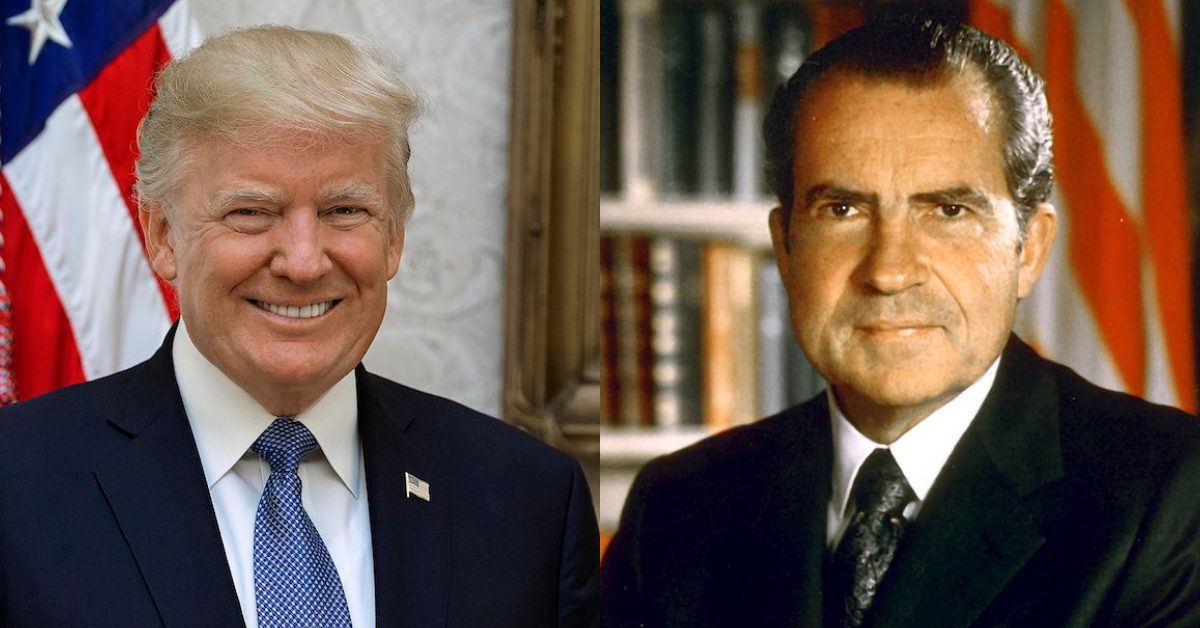It seems everyone in the United States has an opinion about the impeachment of President Donald Trump, as they should.
However some opinions are better formed than others.
While people can do the research regarding constitutional law, those who have studied and practiced it for years are best equipped to comment on that aspect of the impeachment proceedings. Now, 17 of those constitutional law experts have spoken out in an OpEd for The Washington Post.
More than expertise in constitutional law, these individuals have experience with the impeachment process after working on the Watergate case against President Richard Nixon. While Nixon resigned before the case could be completed, the writing was on the wall.
The Watergate prosecutors began by stating outright:
"We, former members of the Watergate special prosecutor force, believe there exists compelling prima facie evidence that President Trump has committed impeachable offenses."
They added that ultimately, the decision rests with the House of Representatives alone.
"The ultimate judgment on whether to impeach the president is for members of the House of Representatives to make. The Constitution establishes impeachment as the proper mechanism for addressing these abuses; therefore, the House should proceed with the impeachment process, fairly, openly and promptly."
The obstruction by the President, disallowing key members of the Trump administration to testify, does not change anything either.
"The president's refusal to cooperate in confirming (or disputing) the facts already on the public record should not delay or frustrate the House's performance of its constitutional duty."
They then mapped out the factors they considered in coming to their conclusion.
"In reaching these conclusions, we take note of 1) the public statements by Trump himself; 2) the findings of former special counsel Robert S. Mueller III's investigation; 3) the readout that the president released of his phone call with Ukrainian President Volodymyr Zelensky; 4) the president's continuing refusal to produce documents or allow testimony by current and former government employees for pending investigations, as well as for oversight matters; and 5) other information now publicly available, including State Department text messages indicating that the release of essential military aid to Ukraine was conditioned on Ukraine's willingness to commence a criminal investigation designed to further the president's political interests."
They asserted the same crimes committed by Nixon also apply to President Trump: obstruction, abuse of power and contempt of Congress.
They added specifics as well.
"Trump conditioned protection of the military security of the United States and of an ally (Ukraine) on actions for his personal political benefit."
"Trump subordinated the integrity of our national electoral process to his own personal political interest by soliciting and encouraging foreign government interference in our electoral process, including by Russia and China. He also appears to have demanded that Ukraine investigate a potential 2020 political opponent and pursue the conspiracy theory that Ukraine had interfered in the 2016 presidential election, despite the unanimous conclusion of the U.S. intelligence community that it was Russia that had interfered."
"According to the evidence laid out in the Mueller report, Trump engaged in multiple acts of obstruction of justice in violation of federal criminal statutes and of his oath of office to 'take care that the laws be faithfully executed.' Because Mueller viewed Justice Department policy as precluding him from filing criminal charges against the president, the special counsel appropriately stated that these abuses are for Congress to address."
"Trump obstructed lawful congressional investigations by systematically withholding evidence and by directing government agencies and employees to refuse to cooperate with legitimate oversight by Congress. Most significantly, the president's blanket refusal to honor requests for relevant information sought by House members conducting an impeachment inquiry constitutes impeachable contempt and obstruction. The public is entitled to know the facts, and Congress is the body our democracy has entrusted with uncovering them."
They concluded their assessment with an appeal to the Republican controlled Senate.
"If a bill of impeachment comes before the Senate, we urge all members of the Senate to put aside partisan loyalties and carry out their own constitutional duties courageously and honestly. In 1974, it was a group of Republican senators who put national interest over party loyalty and informed Nixon that his conduct was indefensible and would compel conviction by the Senate and removal from office."
"We hope the current Senate would similarly put honor and integrity above partisanship and personal political interest."
50% of US agree
Law scholars
Prosecutors
All say the same thing...#ImpeachTrump
The problem is the #GOP who continue to damage our country and the world by giving cover to an unfit, unstable President
— Luo Ji (@PrinceDeepWater) December 11, 2019
DUMBASSERY! pic.twitter.com/eMfnOeZYUk
— sandi baise (@sandibaise1) December 11, 2019
The House unveiled their Articles of Impeachment Tuesday. From their debate continues until the House officially votes to impeach or not.
The book Bringing Down A President: The Watergate Scandal is available here.
 SECONDNEXUS
SECONDNEXUS percolately
percolately georgetakei
georgetakei comicsands
comicsands George's Reads
George's Reads








